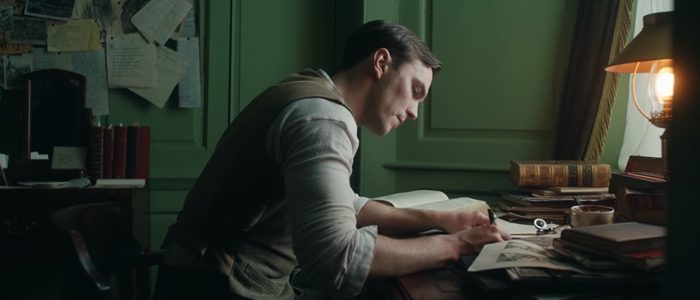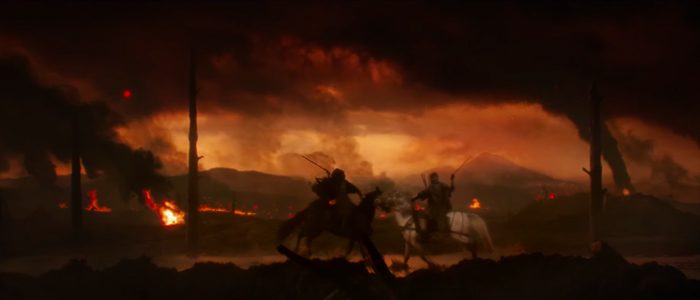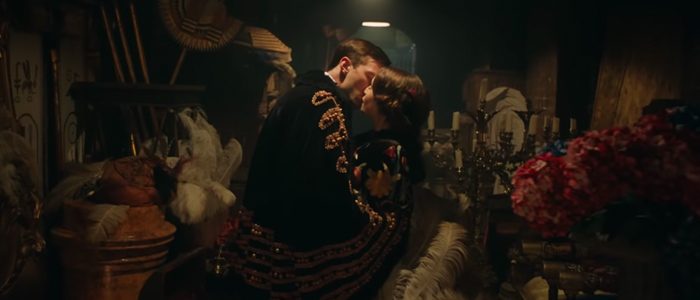Talkin' 'Tolkien' With Director Dome Karukoski [Interview]
During a recent trip to London, /Film sat down with Finnish director Dome Karukoski to discuss his newest film, Tolkien, a biopic of the author who created The Hobbit and The Lord of the Rings. Karukoski had just finished making a different biopic when this project came his way, so he was resistant to it at first. But he quickly found a personal connection to the material through the parallels between Tolkien's early life and his own.
In this interview, we spoke about how the script's message of changing the world through art resonated with him, how he created the movie's striking battlefield sequences, the intense fandom surrounding Tolkien and his work, how he reacted when the Tolkien estate released its statement about his movie, and more.

I assume you can't make a movie like this without being a Tolkien fan yourself, but how deep did your fandom run before you started making this?
When I started, I probably could not name the seven sons of Fëanor from The Silmarillion. Now, because I re-read The Silmarillion, I think I could name most of them. But my fandom starts at the age of twelve. I didn't do LARP-ing, but I did do Dungeons and Dragons board games. I read The Lord of the Rings at the age of twelve or thirteen, did the D&D board games, read The Hobbit, read The Silmarillion at an adult age, and then started reading The Adventures of Tom Bombadil and other books slowly and slowly, going more toward the artist himself. So I've read probably most of his books, and re-read many of them when I started working on this project.
I would say that my fandom is at kind of a personal level. When I started reading The Lord of the Rings, I was bullied. I was an outcast. I grew up without my father. I grew to know my father in my late teens. So basically, the stories, being alone and miserable, became my friends. Creating worlds, imagining, and if you've ever played D&D board games, you are creating the world and the game while you're going. So in a way, the fandom is very deep rooted in me.
Is that the biggest aspect of this particular story that you related to as a filmmaker?
No. I thought, when I opened the script, it was intriguing because the script came just before we released Tom of Finland, so I'd just finished with another biopic and thought, 'Ugh, I don't want to do another biopic.' But I read it as a Tolkien fan, and that draft – several drafts ago – didn't have that many fantasy elements in it. So it was more about a story of friendship of love. Then what struck me in it was the similarity of growing up without a father. What happens to you is, you kind of feel like an outsider. I was born in Cyprus, moved to Finland at the age of four and a half. Tolkien [was born in South Africa and] moved to England [at a young age]. There were so many things that I could relate to him, especially at that time, which was very instrumental to my growth.
But I didn't even know about that. I knew about C.S. Lewis and the Inklings and thought, 'That's the thing. It's him debating about elves with C.S. Lewis at the Eagle and Child.' No! It's actually a very cinematic and dramatic story about a boy becoming who he is, and finding love and finding friends. It didn't hurt, being a Tolkien fan, but it wasn't the main motif in the film. I think you can make a film that can inspire people. What [these characters] wanted to do was change the world with art. They actually uttered that line. That was their essential promise. Make a film about that. Who wouldn't want to do that?
I imagine there was a danger of having the entire movie be nothing but nods and winks and sort of losing the soul of the film along the way, so can you tell me about striking the balance between depicting inspirations for Tolkien's later works and simply telling the story of his life?
The story itself was quite touching. Even if you're not a Tolkien fan, you can relate and feel strong emotions about the story of friendship and love. So then, what happened was as a Tolkien fan, it's just about pleasing yourself, your own appetite. What was really crucial to me is I always hate biopics where a band, they hear a beat and then go to the studio and make their greatest hit ever. Tolkien was very, very explicit that he didn't have those one on one inspirations, so I wanted to respect that also. But hating the biopic [tropes] and respecting the author himself, it was more to me kind of like he's sketching. The nods or the winks, yes, they're easter eggs for those who are really fans, but because we're not depicting the time when he's writing the books, we're depicting the time when he's creating things in his mind, it becomes more like he's sketching his masterpiece. Like [the Sistine Chapel], he's drawing lines slowly over the years, sketching a painting.
The elements there will become something later. An example is the fallen knight. It's not a Nazgul yet. It's that he envisions an heroic person through the story of his mother. Then, when his mind corrupts and changes and goes into turmoil in war, that white knight turns into a fallen knight. So he's slowly and slowly generating this world. Later on, he will use that element for something else.

Talk about visualizing that otherworldly approach to some of the battlefield scenes.
I'm privileged that I read the books before the films. So the Mordor, or the Middle-earth, or in this case Angband from The Silmarillion also, is not yet Mordor. It's not yet Angband. It's the thought of, 'Where will the lord of evil rise? Where is the ultimate evil?' You go into that place. So I've been able to see that before the movies. So it's kind of my own vision in that sense. And of course you work with conceptual artists and we had a wonderful VFX company called One of Us here in London, and they've done big films and have a lot of good artists, so what happens is, as a director, you just start creating with the artists. Many of those images are basically coming from my own childhood. You find a storyboard artist who's good, you draw it with them, and then they become paintings, and those become images in the film. A lot of the war images were drawn – even though it's mayhem, extras running and horses running – we'd have to get those images what they are. As a filmmaker, you rarely get to do a film like this because it's a dream job for a person like me.
Based on the nature of his work and the fandom he's inspired, I'm guessing a significant percentage of Tolkien's readers have done their own research into the events of his real life – maybe more so than the subjects of other biopics. Did the extent of his fame and the intensity of his fans add any extra pressure for you to get the details right?
Yes and no. When you're making a film about an icon that's so important for people, and you have people who have actually visited his Oxford home, different levels of fans, you assume exactly correctly. What I did for the research period was to meet different levels of fans, as many people who've researched him, different experts. What often happens is, this person here will say something: 'Well, he would do A to B.' And then another person would say, 'Oh, no, no. Totally wrong. It was B to C.' So you find people saying totally different opinions because people form their own opinions. So the answer is, yes there's pressure, but the answer is also no, because you can't please everybody. You have to accept that I can only make this interpretation of the events and [capture] the emotional truth.
We take artistic liberties in the film, but we are very true to the characters. That was one thing that, with all the TCBS [editor's note: the TCBS was a secret society Tolkien co-founded as a young man], I did extremely thorough research on the characters. Reading their letters, who they are, reading about them, watching the illustrations and paintings that tell a lot. I went to art university, so you learn a lot by how a person draws a line at a certain age. The timbre changes, and it just goes to the character. So the characters are so true, that I don't think any fan could debate me about that. We can debate some evidence, which could have been changed for dramatic purposes, but the characters are true.
That truth comes through in the movie. I wonder what your reaction was to the Tolkien estate putting out their statement. I understand they haven't seen the movie yet?
They haven't seen the movie. I actually offered them, and haven't gotten a response yet, for them to watch the movie with me. They would see it, I could explain it. Actually, the statement wasn't hostile at all. To me, it felt more like, 'please, journalists, don't call us.' I actually felt very nice about it because it's more just announcing that [they weren't involved]. You know, nine out of ten biopics are done without the estate. There's a good reason to do it.
It doesn't seem to me that there's anything objectionable in this film. You were talking about taking artistic liberties, but it didn't strike me that you were taking any big swings [in the characterizations].
It's done with respect and admiration. We're not demonizing the character, and I'm not putting him on a pedestal. For instance, Oxford, we can talk about Catholicism. He himself wrote that 'during Oxford, I wasn't a good Catholic. I didn't go to church.' He didn't really meet Father Francis. As he said, "I was a bit 'merry' then." You know, you're a young kid at Oxford. You've lost your girl. Perhaps someone would come to say to me that he'd have to be Catholic at Oxford also. Well, he wasn't that – I mean, he was, the religion never left him, but the truth is he was a bit 'merry' at the time. Merry, and, of course, in pain, because he's lost Edith. You have to be honest to yourself and be honest to the character, and I think that's when you respect the protagonist and the character.

Do you have a favorite scene or shot or moment from the movie?
Such an easy one. Backstage opera. Originally, their first kiss was something totally different. But he always loved to dress [in costumes]. He also was on stage. So I wanted to find a way to pay homage to that, and I couldn't put the scene at Oxford. At Oxford, he used to dress as a knight and scare people. I wanted that part of his character, to somehow create that emotion that he had. There was a place where that idea arose, where they would do as Tolkien would have done: be another character. It was cold. It was Liverpool, they had to act like they weren't cold. We were rushed, trying to find time, and we had this amazing Steadicam operator Karsten Jacobsen, who saved it. Without him, we could not have achieved it in the given time. When I put it together for the first time, I was really worried about it, I had really meticulously chosen the music cues. When I saw it the first time, I cried: partly because, 'Yes, I don't have to live with shame!' and part of it was that the emotion was exactly right.
***
Tolkien arrives in theaters on May 10, 2019.
